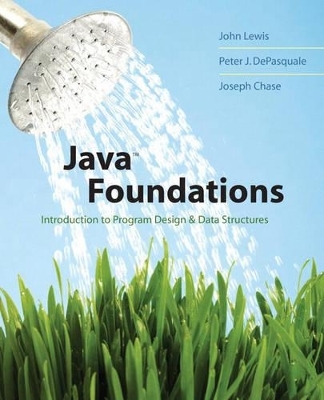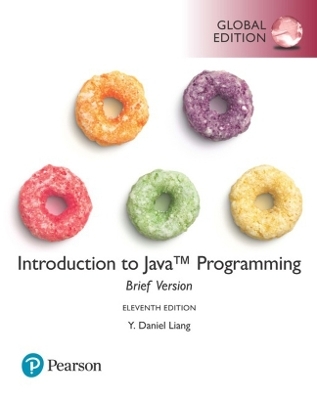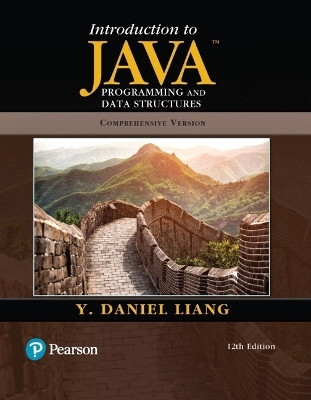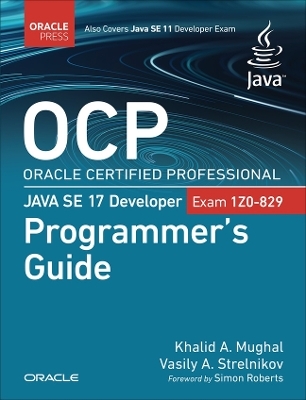
Java Foundations
Pearson
978-0-321-42972-8 (ISBN)
- Titel erscheint in neuer Auflage
- Artikel merken
John Lewis is the co-author of the Java Software Structures textbooks used for AP computer science classes, the Java Software Solutions textbook, Java Software Structures, and Programming with Alice and Java. He teaches courses at both Virginia Tech and Radford University. He received his Ph.D. degree from Virginia Tech. Peter DePasquale is an assistant professor of computer science at the College of New Jersey (TCNJ). He is the author of Addison-Wesley’s Java Backpack Reference Guide and Addison-Wesley’s C++ Backpack Reference Guide. Joe Chase is an associate professor of computer science at Radford University. He is the co-author of Java Software Structures and Java Software Structures for AP* Computer Science AB.
Chapter 1 Introduction
1.1 The Java Programming Language
1.2 Program Development
1.3 Problem Solving
1.4 Software Development Activities
1.5 Object-Oriented Programming
Chapter 2 Data and Expressions
2.1 Character Strings
2.2 Variables and Assignment
2.3 Primitive Data Types
2.4 Expressions
2.5 Data Conversion
2.6 Reading Input Data
Chapter 3 Using Classes and Objects
3.1 Creating Objects
3.2 The String Class
3.3 Packages
3.4 The Random Class
3.5 The Math Class
3.6 Formatting Ouput
3.7 Enumberated Types
3.8 Wrapper Classes
Chapter 4 Conditionals and Loops
4.1 Boolean Expressions
4.2 The if Statement
4.3 Comparing Data
4.4 The switch Statement
4.5 The while Statement
4.6 Iterators
4.7 The do Statement
4.8 The for Statement
Chapter 5 Writing Classes
5.1 Classes and Objects Revisited
5.2 Anatomy of a Class
5.3 Encapsulation
5.4 Anatomy of a Method
5.5 Static Class Members
5.6 Class Relationships
5.7 Method Design
5.8 Method Overloading
Chapter 6 Graphical User Interfaces
6.1 GUI Elements
6.2 More Components
6.3 Layout Managers
6.4 Mouse and Key Events
6.5 Dialog Boxes
6.6 Some Important Details
6.7 GUI Design
Chapter 7 Arrays
7.1 Array Elements
7.2 Declaring and Using Arrays
7.3 Arrays of Objects
7.4 Command-line Arguments
7.5 Variable-Length Parameter Lists
7.6 Two-Dimensional Arrays
Chapter 8 Inheritance
8.1 Creating Subclasses
8.2 Overriding Methods
8.3 Class Hierarchies
8.4 Visibility
8.5 Designing for Inheritance
Chapter 9 Polymorphism
9.1 Late Binding
9.2 Polymorphism via Inheritance
9.3 Interfaces
9.4 Polymorphism via Interfaces
Chapter 10 Exceptions
10.1 Exception Handling
10.2 Uncaught Exceptions
10.3 The try-catch Statement
10.4 Exception Propagation
10.5 The Exception Class Hierarchy
10.6 I/O Exceptions
Chapter 11 Building, Testing, and Debugging
11.1 Building Larger Applications: JFMail
11.2 Packages
11.3 Building Java Projects
11.4 Testing
11.5 Debugging
Chapter 12 Recursion
12.1 Recursive Thinking
12.2 Recursive Programming
12.3 Using Recursion
Chapter 13 Searching and Sorting
13.1 Searching
13.2 Sorting
13.3 Analysis of Algorithms
13.4 Analyzing Searching and Sorting Algorithms
Chapter 14 Collections and Linked Lists
14.1 Introduction to Collections
14.2 A Bag Collection
14.3 An Array Implementation of a Bag
14.4 Linked Lists
14.5 A Linked Implementation of a Bag
Chapter 15 Stacks and Queues
15.1 Stacks
15.2 Evaluating Postfix Expressions
15.3 Implementing Stacks with Arrays
15.4 Implementing Stacks with Links
15.5 The java.util.Stack Class
15.6 Queues
15.7 Radix Sort
15.8 Implementing Queues with Arrays
15.9 Implementing Queues with Circular Arrays
15.10 Implementing Queues with Links
15.11 Analysis of Stack and Queue Implementations
Chapter 16 Trees
16.1 Tree Terminology
16.2 Tree Traversals
16.3 Strategies for Implementing Trees
16.4 A Binary Tree Implementation
16.5 Decision Trees
Chapter 17 Search Trees and Heaps
17.1 Binary Search Trees
17.2 Binary Search Tree Implementation
17.3 Balance Binary Search Trees
17.4 Heaps
17.5 Heap Implementation
17.5 Heap Sort
Chapter 18 Graphs
18.1 Undirected Graphs
18.2 Directed Graphs
18.3 Weighted Graphs
18.4 Common Graph Algorithms
18.5 Strategies for Implementing Graphs
Appendixes
A Glossary
B Number Systems
C The Unicode Character Set
D Java Operators
E Java Modifiers
F Java Graphics
G Java Applets
H Regular Expressions
I Javadoc Documentation Generator
J Java Syntax
Index
| Erscheint lt. Verlag | 13.4.2007 |
|---|---|
| Sprache | englisch |
| Maße | 187 x 231 mm |
| Gewicht | 1338 g |
| Themenwelt | Informatik ► Programmiersprachen / -werkzeuge ► Java |
| Mathematik / Informatik ► Informatik ► Web / Internet | |
| ISBN-10 | 0-321-42972-9 / 0321429729 |
| ISBN-13 | 978-0-321-42972-8 / 9780321429728 |
| Zustand | Neuware |
| Informationen gemäß Produktsicherheitsverordnung (GPSR) | |
| Haben Sie eine Frage zum Produkt? |
aus dem Bereich


